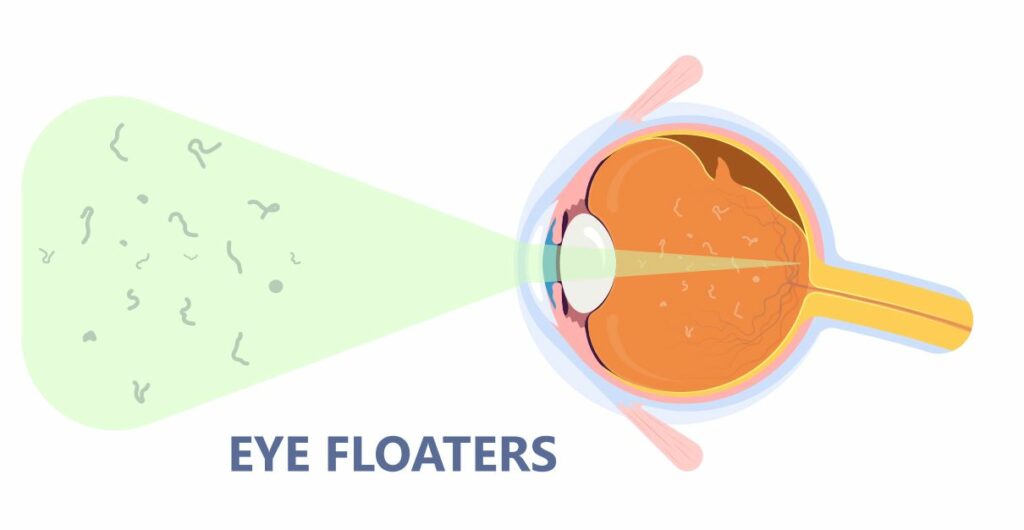Eye floaters are a common visual phenomenon that can be quite concerning for those experiencing them for the first time. These tiny specks, cobwebs, or squiggly lines appear to drift through your field of vision, especially when looking at a bright, plain background like a clear sky or a white wall. While usually harmless, eye floaters can sometimes indicate more serious underlying issues. Let’s delve into the causes, risks, and treatments for eye floaters, including surgical options and the potential benefits of dietary changes like eating pineapple and Vitamin C.
What Are Eye Floaters?
Eye floaters, also known as syneresis, are small clumps of fibrous collagen cells that form in the vitreous humor, the clear, gel-like substance that fills the inside of your eye. As we age, the vitreous gel can separate into liquid and fiberous particles which cast shadows on the retina, appearing as floaters.
Common Causes of Eye Floaters
- Aging: The most common cause of eye floaters is the natural aging process. As you age, the vitreous humor gradually shrinks and forms clumps.
- Posterior Vitreous Detachment (PVD): This occurs when the vitreous humor detaches from the retina, often leading to an increase in floaters.
- Inflammation: Conditions like uveitis, which cause inflammation in the eye, can lead to the formation of floaters.
- Bleeding: Bleeding in the eye due to injury, diabetes, or hypertension can introduce blood cells into the vitreous humor, appearing as floaters.
- Retinal Tears or Detachments: These are serious conditions where the retina tears or detaches from its normal position, often accompanied by a sudden increase in floaters.
Risks Associated with Eye Floaters
While many eye floaters are benign and merely a nuisance, they can sometimes indicate more serious conditions that require immediate medical attention.
Warning Signs
- Sudden Increase in Floaters: A sudden, significant increase in floaters, especially when accompanied by flashes of light, could indicate a retinal tear or detachment.
- Peripheral Vision Loss: If you notice a shadow or curtain effect over part of your visual field, this could be a sign of retinal detachment.
- Persistent Pain or Redness: If floaters are accompanied by persistent pain or redness, it could indicate an underlying inflammatory condition or infection.
- Blurred Vision: Significant blurring of vision alongside floaters may indicate a more severe problem that needs prompt evaluation.

Treatment Options for Eye Floaters
Treatment for eye floaters varies depending on their cause, severity, and impact on your vision.
1. Observation and Monitoring
For most people, eye floaters are a mild inconvenience that doesn’t require treatment. Often, they become less noticeable over time as the brain adapts to their presence. Regular eye exams are important to monitor the condition and rule out more serious issues.
2. Vitrectomy
A vitrectomy is a surgical procedure where the vitreous humor, along with the floaters, is removed and replaced with a saline solution. This procedure is typically reserved for severe cases where floaters significantly impair vision, as it carries risks such as retinal detachment and cataract formation. Typically, the vitreous core is removed only as that is where the majority of floaters exist. However, a full vitrectomy may be an option with patients who have excessive floaters throughout their vitreous.
3. Laser Vitreolysis
Laser vitreolysis involves using a YAG laser to break up the floaters, making them less noticeable. This procedure is less invasive than vitrectomy and can be an effective option for certain types of floaters. However, not all floaters are suitable for this treatment, and the success rate can vary since the laser simply breaks apart a larger floater into many smaller floaters.
Dietary Approach: Can Eating Pineapple Help Eye Floaters?
A recent small study published in Taiwan suggest that eating pineapple may help reduce eye floaters. Pineapple contains high levels of bromelain, an enzyme with anti-inflammatory and enzymatic properties that could potentially break down the proteins causing floaters.
Benefits of Pineapple
- Rich in Bromelain: Bromelain has anti-inflammatory properties that may help reduce the incidence of floaters by breaking down protein clumps in the vitreous humor.
- High in Vitamin C: Pineapple is also rich in vitamin C, an antioxidant that supports overall eye health and can help protect against oxidative stress.
- Hydration: Pineapple has a high water content, which can help maintain overall eye hydration and vitreous health.
Incorporating Pineapple into Your Diet
To potentially benefit from pineapple’s eye health properties, consider incorporating it into your daily diet. Here are a few ideas:
- Fresh Pineapple Slices: Enjoy fresh pineapple slices as a snack or dessert.
- Pineapple Smoothies: Blend pineapple with other fruits and leafy greens for a nutritious smoothie.
- Pineapple in Salads: Add pineapple chunks to salads for a sweet and tangy twist.
While the effectiveness of pineapple in reducing floaters is not conclusively proven, its nutritional benefits make it a healthy addition to your diet.
Eye floaters are a common visual phenomenon that, while often harmless, can sometimes indicate serious underlying conditions. Understanding the causes and risks associated with floaters is crucial for early detection and treatment of potential issues. Treatment options range from observation to surgical interventions like vitrectomy and laser vitreolysis, depending on the severity of the floaters. Additionally, exploring dietary approaches, such as incorporating pineapple into your diet, may offer some benefits due to its anti-inflammatory properties. Regular eye exams and prompt attention to any sudden changes in your vision are essential for maintaining eye health and preventing complications.
At Optical Illusions: An Optometric Practice, we prioritize your eye health and provide comprehensive care to help you manage and treat eye floaters. Our experienced optometrists and opticians use state-of-the-art technology to evaluate your eye health and design personalized treatment options. Schedule your eye exam today and take proactive steps towards safeguarding your vision and health. Contact our team to schedule your appointment at 1 of our 4 conveniently located offices.



